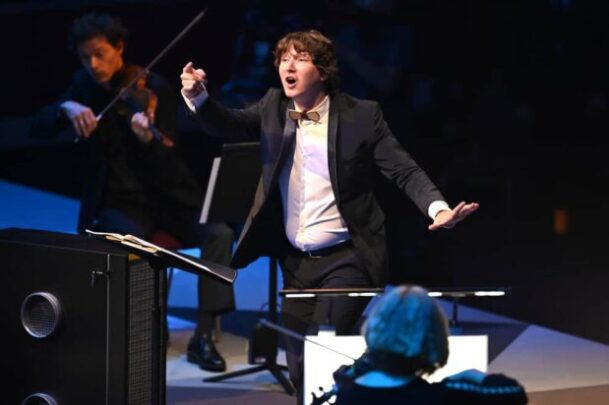 United Kingdom Mendelssohn: Hilary Cronin and Jessica Cale (sopranos), sopranos and altos of the SCO Chorus, Scottish Chamber Orchestra / Maxim Emelyanychev (conductor). Usher Hall, Edinburgh, 2.3.2023. (SRT)
United Kingdom Mendelssohn: Hilary Cronin and Jessica Cale (sopranos), sopranos and altos of the SCO Chorus, Scottish Chamber Orchestra / Maxim Emelyanychev (conductor). Usher Hall, Edinburgh, 2.3.2023. (SRT)

Mendelssohn – Symphony No. 4 ‘Italian’; A Midsummer Night’s Dream, Overture & Incidental music
Who would you name as the most underrated composer of the mainstream classical canon? Not an unjustly neglected female composer whose music is only now coming to light, nor a Romanian baroque virtuoso who wrote dozens of mandolin concertos but who no one has heard of for centuries. No: a famous composer whose name everybody knows and of whose music it would be easy to find many recordings, but who doesn’t get the credit he is due?
For me that is easy: Mendelssohn. He was the child prodigy to beat all child prodigies – even Mozart! – and every music-lover both knows his work and says they love it; but his music is only programmed every so often and he doesn’t fill halls in anything close to the way that his fellow early nineteenth-century German composers do. That might be part of the reason why this all-Mendelssohn concert was played to an Usher Hall that was only about a quarter full. Come, on people: wake up to what you are missing!
More fool the stay-at-home-ers, though, because the people who did show up got an absolute treat. It is always special when Maxim Emelyanychev conducts the Scottish Chamber Orchestra, and this concert was full of moments that had me smiling from ear to ear, right from the opening burst of the Italian Symphony, which was like the popping of a cork from a bottle of prosecco. Emelyanychev is a brilliant musical technician who thinks deeply about the sound he wants and constructs it with painstaking care. That extends to where every musician sits, tonight with basses high up at the back centre and bassoons next to horns, or the instruments they use, with gut strings across the board and natural brass and timpani.
The results speak for themselves and, importantly, there is never any sense of cookie-cutter uniformity. The main theme of the first movement, for example, shone like a ray of sunshine, violins playing with breezy vibrato and carefree ease. The second, on the other hand, was all but stripped of vibrato, adding a pang of unease to the funereal procession, and the natural brass and timps cut right through the texture in the minor key passage of the third movement’s trio. Everything sounded carefully prepared and beautifully delineated, including the skin-tight finale which was breathless but always brilliantly controlled.
Period instruments bring gains and losses, of course. The wheezy ophicleide added an extra honk to the big orchestral moments of A Midsummer Night’s Dream and the full brass contingent sounded fantastically ceremonial in the wedding march. Some of the horn notes in the Nocturne, on the other hand, sounded unavoidably squashed so that a lot of that movement’s consoling beauty got lost in the forest. However, the fairy music sounded even more daringly strange on gut-stringed violins, played with beautiful delicacy, and the winding down of the sleepy final bars was bewitching. So, too, was the singing of the ladies of the SCO Chorus and, even more so, the beautifully rich soprano of voices of Hilary Cronin and Jessica Cale.
If anything, Emelyanychev seemed unusually well behaved on the podium tonight. There were no big gestures or dazzling surprises. Instead, we got a carefully constructed and beautifully considered exposition of Mendelssohn’s gorgeous scores, which from any orchestral team would be pretty darned terrific. The very fact that I am noticing this reflects how consistently Emelyanychev knocks it out of the park with a fresh revelation or a new idea, and it definitely isn’t a complaint. After all, we should never let the stunning be the enemy of the merely excellent.
Simon Thompson
